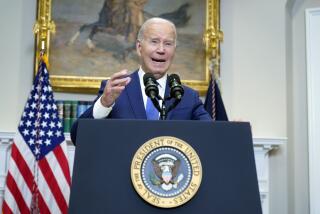Obama signs patent-approval law
- Share via
Reporting from Washington — Overhauling the nation’s creaky patent system isn’t a step that economists believe will solve the jobs crisis. But in a gridlocked Washington, speeding up patent approvals was one of the few areas where both parties were willing to take action.
President Obama marked the rare outbreak of bipartisan agreement by signing into law Friday the America Invents Act, a measure that he pushed repeatedly over the summer as necessary to create jobs.
The patent reforms are considered the most sweeping in the last 60 years, analysts say, the resolution of an issue Congress has kicked around for eight years. Yet even as Obama hailed its passage, he recognized its negligible short-term effect on what voters care most about: jobs.
“This change in our patent laws is part of our agenda for making us competitive over the long term,” he said. Obama used the signing ceremony to tout his new jobs bill.
“I have to take this opportunity, while I’ve got some members of Congress here, to say I’ve got another bill that I want them to get passed to help the economy right away. It’s called the American Jobs Act,” he said, referring to his $447-billion proposal to Congress.
Business interests also welcomed the patent overhaul, though the new law isn’t likely to unleash a wave of hiring. The payoff might be years down the road, economists said.
Applying for a U.S. patent is a bureaucratic slog: The patent office has a backlog of 689,000 applications and approval of a new patent takes nearly three years. It took Thomas Edison less than two months to get a patent for the phonograph in the 19th century.
“I don’t think this means a lot of jobs next year, but it may mean a meaningful number of jobs over the next decade or two,” said Mark Zandi, an economist who has advised the White House.
“Even in the best-case scenario, this will have zero net short-term effect,” said Dean Baker, co-director of the Center for Economic and Policy Research, a left-of-center think tank. “Its impact this year or next will be basically zero.”
The law aims to streamline the process so that entrepreneurs develop products more quickly. It changes the system by awarding patents to the first person to submit an application — not to the original inventor. Proponents hope this step will reduce lawsuits and thus expedite patent approvals.
Opponents worry that the law favors large corporations over small inventors, because well-staffed companies are better positioned to quickly file patent applications.
Obama signed the bill at Thomas Jefferson High School for Science and Technology in Alexandria, Va., where students displayed robots, satellites and other inventions. At the ceremony, the president said that “somewhere in that stack of applications could be the next technological breakthrough, the next miracle drug, the next idea that will launch the next Fortune 500 company.”
“And somewhere in this country — maybe in this room — is the next Thomas Edison or Steve Jobs, just waiting for a chance to turn their idea into a new, thriving business.”
Some analysts questioned Obama’s inclusion of patent reform in his larger job-creation agenda. During a Midwest bus tour over the summer, Obama cast the legislation as one of the steps Congress could take right away that would boost the economy. He told an audience in Minnesota that his patent proposal was one of several ideas to “put people to work right now.”
That Obama would devote that much time to such a specialized proposal seemed to underscore a grim reality: The president had few tools left to combat the high jobless rate. Another stimulus program seemed out of the question, and the Federal Reserve had already cut interest rates to the bone.
Even fellow Democrats complained that patent reform and other small-scale proposals Obama championed didn’t amount to the kind of robust jobs program voters wanted to see.
Obama sought to address that complaint on Sept. 8, when he proposed an ambitious jobs package that would juice the economy through a mix of tax breaks and spending on school, road and bridge repair.
From that point, the president stopped mentioning patent reform as a short-term job creator. On Friday, he portrayed the new law as a fix for the future.
“This change in our patent laws is part of our agenda for making us competitive over the long term,” he said.
Michael A. Memoli in the Washington bureau contributed to this report.
More to Read
Sign up for Essential California
The most important California stories and recommendations in your inbox every morning.
You may occasionally receive promotional content from the Los Angeles Times.













